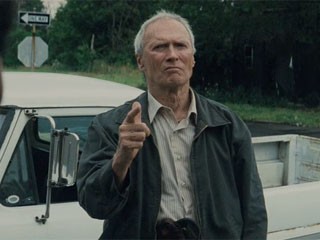When we first meet Walt Kowalski in Gran Torino, we meet a man who really hates the world. He has nothing but contempt for everyone and everything: his kids, his grandchildren, the priest officiating over his wife's funeral, and anyone who is not the same race, color, or nationality as him. He refers to various characters as gooks, spooks, dagos, Chinks, and micks. He sits on his porch all day drinking Pabst Blue Ribbon and looking at his most prized possession, a 1972 Ford Gran Torino. So naturally when Thao, the Hmong teenager next door, is pressured by a gang to try to steal said Gran Torino, it sets off a chain reaction of events that will change the entire neighborhood.
He chases off the gang--hilariously growling "get off my lawn" in typical grumpy old man fashion though aiming a rifle at them--when they come back to beat Thao up. He also saves Thao's sister from three would be rapists. These actions make him a hero to the neighborhood and--whether he wants it or not--friends with his neighbors. He eventually warms up to them, even while calling them gooks. When the gang not only won't go away but crosses the line, Kowalski knows what he has to do to stop them.
In a lesser actor's hands, Kowalski would be just a bad caricature. Fortunately, Clint Eastwood is playing Kowalski, not as a caricature but as a natural extension of the sort of characters he used to play. Kowalski is Dirty Harry after retirement, still angry and willing to kick ass no matter how politically incorrect that may be. It's as classic an Eastwood performance as they come, sometimes humorous, sometimes sad, always awesome. It's a fascinating performance as he allows Walt to change and grow without seeming to. On the one hand, he spouts racial slurs right up to the end. On the other, he develops a closer relationship to Thao and Sue than to his own family. He becomes a father figure to Thao, trying to help him stay out of the gangs and become someone. And when things go very horribly wrong for the family at the end, he becomes determined to not let Thao ruin his own life.
 This is a movie of race and redemption. It is not an action film but a meditation on letting go of prejudice. In Kowalski's case, this doesn't just involve the family but the ever persistent priest who tries his best to reach Walt and get him into confession. It's message, though never preachy, runs through, staring you down the entire time. I suppose that's something that would make some uncomfortable, but uncomfortable truths can sometimes lead to better tomorrows. It is actually quite amazing--to say nothing of disappointing--that the film received no Academy Award nominations. One of the true mistakes by the Academy.
This is a movie of race and redemption. It is not an action film but a meditation on letting go of prejudice. In Kowalski's case, this doesn't just involve the family but the ever persistent priest who tries his best to reach Walt and get him into confession. It's message, though never preachy, runs through, staring you down the entire time. I suppose that's something that would make some uncomfortable, but uncomfortable truths can sometimes lead to better tomorrows. It is actually quite amazing--to say nothing of disappointing--that the film received no Academy Award nominations. One of the true mistakes by the Academy.Ultimately Gran Torino is not dissimilar to John Wayne's last movie, The Shootist. Both movies are about men of violence nearing the end of their lives who find much needed redemption. Gran Torino plays a little less somberly but no less powerfully. It is a chance to see a master actor and director once again prove what made him a legend. It was supposed to be the last movie Eastwood acted in. He did go on to do one more, but this still serves as a fond farewell to a type of character he had done so well over the years.


No comments:
Post a Comment